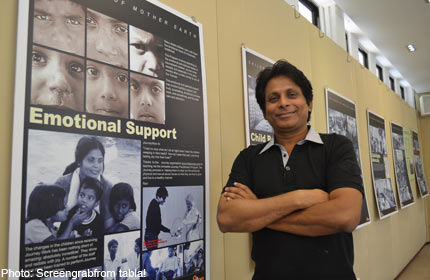My journey as a volunteer started with something of a shock. Seven years ago, I found myself among the rowdiest students I ever encountered. Their bodies were covered with tattoos and vulgarities punctuated their every utterance.
I had signed up to help out at a four-day camp for at-risk youths organised by CARE Singapore.
The objective was for social workers to bond with the so-called delinquents, so they could better understand the challenges the youths were facing.
As a member of the logistics team, my task was clear: To prepare the game stations and clean up after. But my personal goal was even clearer: Simply clock the hours for my school’s Community Involvement Programme.
All that changed as I watched the facilitators and social workers engage and bond with the youths, who confided in them.
It was heartwarming to see the delinquents bare their souls to their new friends.
WHY DO PEOPLE VOLUNTEER?
It got me thinking: Why do the volunteers come back year after year and put themselves through rounds of physically demanding and emotionally-draining camps?
The answer was simple and rang with sincerity — the students matter to them.
The following year, CARE Singapore asked if I wanted to help out again at the camp. I said yes and went on to volunteer in other areas of social need.
Today, I teach sign language every Saturday and have gone back for numerous CARE camps as a facilitator. I am proud to call myself a volunteer.
I know some people — youths and adults alike — are not as enthusiastic about volunteering because they fear the heavy commitment involved.
The compassion and empathy to help others may have been ignited, but it is often the lack of discipline to commit to a responsibility that causes one to hesitate.
However, who said volunteering has to be a lifelong commitment? There is no contract to sign that would obligate a volunteer to remain with an organisation or cause beyond the duration of that individual’s interest to help.
SMALL STEP TO A BIGGER CHANGE
Perhaps it is the way we have promoted volunteerism that is to be blamed. More often than not, words such as “committed” and “passionate” are used in campaigns to recruit volunteers.
The latter is perfectly fine, as a certain degree of passion and empathy is needed for one to extend a helping hand.
The former, however, implies a prolonged dedication and obligations that some potential volunteers may not be willing to commit to, for personal reasons.
So, perhaps, volunteerism should be presented to first-timers as a small step towards a bigger change. Every contribution, small or big, long- or short-term, will go a long way towards making a difference to the lives of others in need.
Then maybe, a one-off stint will transform into two and many more stints. That was how my own journey began.
It is these initial encounters that provide the key ingredient to sustain a volunteer’s dedication to a cause: The relationships that are forged. These relationships need not only be between the volunteer and the beneficiaries, but even among volunteers themselves.
With our hectic lifestyles, it is always easy to tell ourselves that we are too busy to volunteer. However, there have also been many encouraging examples where people still give back to the community despite their busy lives.
The fact is, volunteering may not always start from an altruistic heart. Those who give their time, money and energy, purely out of a heart of gold, truly deserve our applause.
But for others, such as myself, it started in a very small way. It was a small step taken not even for the most noble of reasons.
But it was a step nonetheless — and it has led to countless more, on a path that has helped me grow in many ways.
Felicia Ee, an intern at the National Volunteer and Philanthropy Centre, is a third-year student at the Wee Kim Wee School of Communication and Information at Nanyang Technological University.
Source: TODAY


